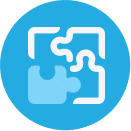Join the Governor’s Council on Developmental Disabilities Arkansas (the Council) in highlighting the many ways in which people with and without disabilities come together to form stronger, more diverse communities.
Together we can raise awareness about the importance of inclusion of people with developmental disabilities in all areas of community life. When we acknowledge the barriers that people with disabilities face in connecting to the communities in which they live, the work can begin to tear down those barriers. The Council, together with our partners, are united in fostering an inclusive culture across Arkansas, because inclusion benefits everyone, enriching the lives of individuals with and without disabilities alike.
Governor Hutchinson has proclaimed March as Developmental Disabilities Awareness Month in Arkansas. See the Proclamation here.
How can we observe Developmental Disabilities Awareness Month (DDAM)?
Act!
Advocacy takes action. Be an advocate or ally by joining a group like Community of Champions or connect with the Self-Advocates Network Development project. You can act to help fight against stigmas and stereotypes. There are many ways to advocate. Learn more here:
https://gcdd.arkansas.gov/advocacy
https://gcdd.arkansas.gov/civic-engagement
https://communityofchampionsar.org/
https://disabilityrightsar.org/sand/
Respect!
People with disabilities (PWD) should be treated with respect, just like everyone else. There is no need to be nervous around people with disabilities. If you are not sure how to act, just say hello and ask. Get to know the person, not the disability.
Treating others with respect is a great place to start. These are a few ways to respectfully interact with a person who has disabilities:
- Speak directly to the person, not to their caregiver.
- Don’t lean on wheelchairs or other assistive equipment.
- Presume competence, or that the person can do things on their own, unless they ask for help or support.
You can view our video on this subject on our YouTube channel here:
https://www.youtube.com/watch?v=nOCiGquLp3E
Share your story!
We encourage you to share stories, photos, and resources to expand the conversation on community inclusion.
On social media search for and use the hashtag #DDawareness2021
Please contact the GCDD staff by emailing [email protected] with info on events, stories, photos, and resources you would like us to share. Share our posts if you see them on social media! Together we can do more, share more, and make a difference.
This year, during DDAM 2021, the Council asked members and their families to submit artwork to share during DDAM. With the artist’s permission, we have highlighted their art in our DD Awareness Month campaign.
Check out our Blog posts during March! In our DDAM 2021 logo, and first blog of the month the “Artist Spotlight”, we feature art by Council member Kasey Hodges. Also in the Artist Spotlight blog, you will read about artist Carolina Gardenhire, daughter of member C.W. Gardenhire.
What else is going on during DDAM?
Arkansas Developmental Disabilities Awareness Month – Council Events:
The Council is hosting a virtual weekly lunch hour support group during DDAM. Each Thursday in March, at Noon, self-advocates or parent advocates are invited to join us for discussion.
Schedule: Thursdays at Noon on Zoom
March 4th, Noon to 1pm – Welcome to DDAM 2021 / Parent Advocate Support
March 11th, Noon to 1pm – Self Advocate Support
March 18th, Noon to 1pm – Parent Advocate Support
March 25th, Noon to 1pm – Self Advocate Support
Find the event on Facebook @gcddar or
Join the Zoom Meeting here https://arkansas-gov.zoom.us/j/87095986354
Meeting ID: 870 9598 6354
or call US Toll-free 1-888-475-4499
History of DDAM
In 1987, President Ronald Reagan made a public proclamation that the month of March should be recognized as Developmental Disabilities Awareness Month to “increase public awareness of the needs and potential of Americans with developmental disabilities.” Though our mission remains largely the same, so much has changed since 1987. While we still aim to increase public awareness, our focus has shifted to the importance of inclusion and acceptance.



